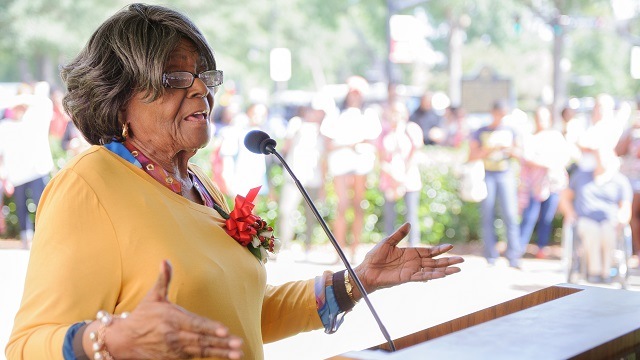By Jamon Smith
Alabama NewsCenter

A giant in civil rights history was recognized Friday with the unveiling of the Autherine Lucy Foster Historic Marker at a ceremony on the lawn of Graves Hall at the University of Alabama.
“Mrs. Foster’s initiative and courage opened the doors and created the opportunity for all races to attend the University,” University President Suart Bell said. “This historic marker will serve as a testament to her enduring impact on our campus and beyond.”
Dr. Peter Hlebowitsh, dean of the College of Education said the idea for the marker came from faculty who petitioned the university to place a historic marker near the site where Foster first attempted to enroll but was driven away by a mob in 1956.
“We are gratified that the university is recognizing Mrs. Foster in this manner,” Hlebowitsh said. “This honor is in keeping with the magnitude of her contributions to the history of our University.”
On being notified of the honor, Foster said, “I never imagined my decision to enroll would affect so many in so many ways. Today, I have several children who have attended the university and am, myself, a proud graduate and member of the alumni association. I am very humbled that the university has chosen to recognize me in this way.”
The Autherine Lucy Foster story is one of persistence, patience and desire for self-improvement. In 1952, after graduating with an English degree from Miles College, she applied to UA but was rejected because of her race. After a three-year legal battle, she was admitted by court order.
On Wednesday, Feb. 1, 1956, she registered as a student in UA’s College of Education. That Friday, Feb. 3, she attended her first class as a graduate student in library science, becoming the first black person in Alabama admitted to a white public school or university. But on Monday, Feb. 6, as some 3,000 protested, the board of trustees expelled her, citing her and other students’ safety.
Marian Accinno Loftin was in a children’s literature class with Foster on that fateful day.
“On Friday, February 3, Autherine’s first day in class, she crossed the Quad alone without notable incident,” Loftin said. “But on Monday a crowd gathered, and the disturbance accelerated. Chants became angry shouts. Our class was dismissed, and Autherine was ushered out of the building to safety.”
In 1988, the University officially annulled her expulsion. The next year she re-enrolled at UA with her daughter, Grazia. Foster earned a master’s in elementary education in 1991 and participated in the graduation ceremony in May 1992 with her daughter, a corporate finance major.
In 1998, UA named an endowed fellowship in Foster’s honor and unveiled a portrait of her in the Student Union Building. She was recognized again in 2010 when the University dedicated the Autherine Lucy Clock Tower recognizing her as one of three UA desegregation pioneers, along with Vivian Malone and James Hood.
“I had the honor of nominating her to the College of Education’s Educator Hall of Fame — our College’s highest honor — and to be seated at her table in 2016 when she was inducted,” Loftin said. It was a delight to see her interact with the guests, who admired her so greatly. Seated in her wheelchair, she was gracious, with a good-natured sense of humor.”
Today, the university is a multicultural campus including more than 4,000 African-Americans among its approximately 38,500 students.
Dr. E. Culpepper “Cully” Clark, former UA dean and communication professor emeritus and author of “The Schoolhouse Door: Segregation’s Last Stand at the University of Alabama,” was also at Friday’s ceremony to honor Foster.



